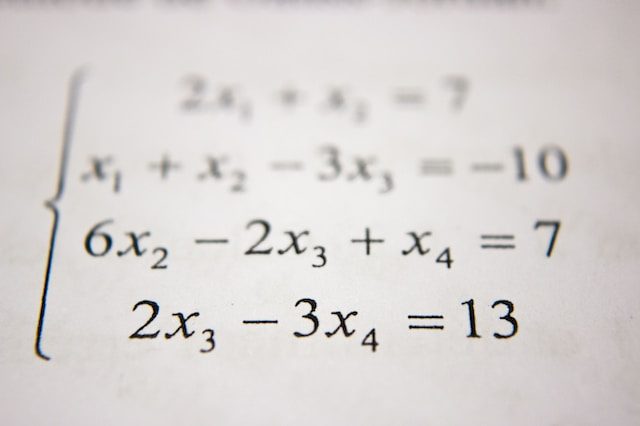A simple formula?
Masking often requires more energy than not masking, because it’s putting effort into appearing to be someone you’re not. But, sadly, there’s more to the equation than simply:
masking less = recovering energy
I’ll admit that masking does sometimes help social situations go more smoothly, because you’re putting in the work to cater to other people’s expectations so they don’t have to put in the work to revise their predictions of how this situation will go. This could be represented as:
masking more = higher initial energy output + lower backend social energy cost
So when does the amount of effort you’re putting into masking actually involve less effort than if that interaction didn’t go as predictably, by the standards of the perceived norm? (Notice that I’m not using judgment words like, ”it went well,” or “it went badly.”) In other words, when is:
energy recovered ≥ higher initial energy output + lower backend social energy cost
Or, in slightly different wording, when is:
energy recovered from less masking ≥ energy output from more masking + energy savings from meeting social expectations
Masking as a function of energy
It’s a weird mental arithmetic because sometimes masking can be too taxing or too much, making you unhappy. But if it helps the situation go more predictably for the other people, sometimes it still may be less tiring in the end.
When I was masking full-time, at the end of the day I was struggling to care, feed myself, or stay upright.
Which is not to say it’s not tiring; it’s absolutely exhausting. When I was masking full-time, at the end of the day I was struggling to care, feed myself, or stay upright. But at least I didn’t also have awkward interactions replaying on repeat in my mind, or have to deal with the fallout from those interactions.
And some of us are so used to masking that it’s genuinely hard not to do it. When I started unmasking a bit, all sorts of worries and fears came up.
I was worried that if I masked any less, people would think I had some sort of personality transplant, that I suddenly didn’t like them anymore, or that I wouldn’t know how to act around people, and that they wouldn’t accept me.
And the most painful part to admit was that I had been masking for so long that I didn’t really have a clue who I was without the mask. So:
masking less initially = higher energy cost from (painful thoughts + trying something new + dealing with the results of subverting people’s expectations of me + figuring myself out in new ways)
As I gradually unmasked, primarily over the course of about three years, though I’m still finding residual bits here and there, it was interesting to see how it actually played out.
How it played out for me
It was distinctly uncomfortable to try expressing what I wanted or needed to other people in ways that I hadn’t much before. And it did take some adjustment for the people around me, and there were questions, and it didn’t always go super smoothly, and there was some backlash, but in general, it went a whole lot better than I was expecting.
Partly because I wasn’t around genuinely abusive or toxic people (and when you are, please take care of your safety), but I was still quite surprised (shocked, flabbergasted, astonished) by how supportive some of the people in my life were.
There was definitely pushback from some, and not everyone “got it” or agreed with my life decisions, but fortunately social norms helped me a bit there; some didn’t say much or merely gave me a “look” and an obviously insincere “oh, well, good for you,” and that was about it. Some said more, but I was at a point in my life when I was less willing to contort my life to maintain their good opinion of me.
And yes, it took energy to deal with all that, especially during the transition period. And plenty of tears were shed, and my therapist heard plenty of rants and whining during those years. But most of my energy was used up in worrying about how they would react, not in dealing with their actual reactions. So:
actual energy drain from masking less = worrying how people would react + dealing with their actual reactions + recalibrating my self-image
There’s a middle ground of satisfying social expectations enough, without harming yourself or others.
I also learned in the process that unmasking does not mean that you have to be rude, or blunt, or piss people off left and right. It doesn’t mean you have to share every thought on your mind or hurt people when you disagree with them.
There’s a middle ground of satisfying social expectations enough, without harming yourself or others. It takes practice to find the unclear, ever-morphing line between masking to meet social norms, as if they were a straitjacket, and easing interactions in a society made up of complex people with a wide variety of needs, desires, and backgrounds.
Compatible goals
I’ll be talking and writing a lot more about that, but here’s a quick intro. I think the essence of unmasking is that you’re presenting an authentic version of yourself to others. And the essence of social norms is to help complex people get along in groups. These are not incompatible.
All of this takes energy. Masking takes energy, unmasking takes energy.
Getting along can look very different from what the straitjacket version of norms expect. You don’t have to say a particular thing or make a particular facial expression if you can express yourself in other ways, and build the skills to clarify miscommunications as they (inevitably) come up. So:
healthy unmasking around others = presenting an authentic version of you + finding new ways to get along
And yes, that takes energy. All of this takes energy. Masking takes energy, unmasking takes energy.
Final thoughts
What I will leave you with, is this: the energy expended in masking never decreases, no matter how good you get at it. And, unfortunately, the better you get at it, the more energy it takes. Both now and for as long as you keep it up. That never goes away and the longer you do it, the harder it gets to stop.
Unmasking takes an energy investment in the transition, but it doesn’t last forever. It can take a while, but the energy output of getting to know your authentic self, learning new skills, letting go of painful thoughts, gradually presenting that to the world, and dealing with the repercussions of the transition, doesn’t last forever. That may seem like a lot, but as you slowly do those, you gradually get more and more energy back, and that energy sticks around.
That said, I’m not going to tell you which one you should do. I don’t know your life or your circumstances, but you do. You know which equation(s) you can live with, both in the short term and long term.
Masking, or unmasking, is not an all-or-nothing thing.
Also, any choice you make is not permanent. Masking, or unmasking, is not an all-or-nothing thing. You can do a little, or keep a little. You can do it in different ways, at different times, with different people, or in different circumstances, and not others. Do what feels best for you at this point in your journey, and modify as you go.




